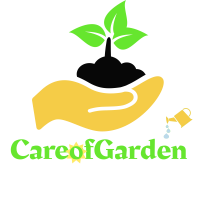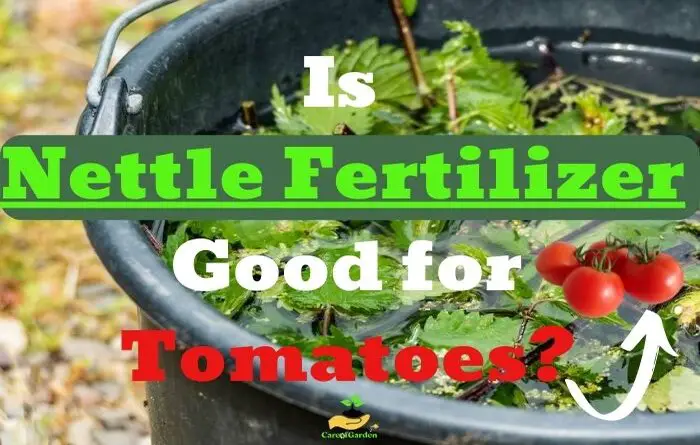Is Nettle Fertilizer Good for Tomatoes? (Quick Answer)
Nettle manure and tomatoes are an inconspicuous duo, but using nettle tomato fertilizer can produce amazing results! Find out if nettle fertilizer is good for tomatoes and why when growing tomatoes it is worth using nettle fertilizer as a good alternative for its mineral composition.
See how to make nettle fertilizer and apply it to make the tomatoes grow like crazy!
This way you get a quick improvement in plant growth that was in bad shape. It is also worth noting that tomato fertilizer made from nettles not only provides plants with the nutrients they need and provides growth enhancement, but also reduces tomato disease.
Is Nettle Fertilizer Good for Tomatoes ?
An example of a fertilizer that will make tomatoes grow like crazy is the natural tomato fertilizer made from nettles. Nettles are rich in nutrients such as nitrogen, potassium and magnesium, iron, calcium, silicon, manganese, zinc, organic acids and mineral salts.
Nettle manure is also excellent for stimulating growth for your tomatoes and other plants. And for good reason, this homemade fertilizer is rich in nitrogen, which promotes the good development of tomato plants. For this, spray the mixture every three weeks, from mid-June to the end of July.
Rich in nitrogen and potassium, nettle manure is used as tomato fertilizer each spring. It stimulates the growth of tomatoes and strengthens them, making them more resistant to diseases. It is enough to use it in watering twice a month, diluted at 10%.
Rich in organic matter, nettle slurry stimulates the decomposition of matter and helps warm the compost. Then sprinkle your compost with nettle manure without dilution and stir it. Once mature, compost is an excellent amendment for your tomatoes.
Since tomato fertilizer from nettles contains many valuable nutrients, it affects the growth and development of plants, flowering and, as a result, the harvest.
Liquid nettle fertilizer is used to strengthen plants that grow in the ground, as well as tomato plants that grow in containers.
Nettle fertilizer contains:
- Calcium (38%), which is involved in metabolism and photosynthesis. With its deficiency, tomatoes stop growing, dry out.
- Potassium (35%), which activates enzymes involved in the movement of food. This element makes tomato plants powerful and strong.
- Magnesium (7%) involved in the process of photosynthesis. With its lack of foliage fades, crumbles.
- Iron and sulfur, nickel and copper, manganese and silicon are contained in smaller quantities.
However, all these trace elements contribute to effective growth, development and good fruiting of the tomatoes.
Reasons why nettle fertilizer is good for tomatoes:
- Greatly stimulates the growth of tomatoes.
- Acts as a fertilizer for tomatoes thanks to its high levels of nitrogen and potassium.
- The nettle mixture prevents tomato diseases.
- Acts as a compost activator.
- Restore vigor to a weak tomato plant (lack of nitrogen is characterized by weak growth and a yellowish tint of the foliage).
- Strengthen the natural defenses of plants.
- Nettle is antifungal. If small yellow mushrooms grow in your soil, the mixture will effectively eliminate them.
- It actively develops and strengthens tomato immunity because of its rich vitamins and minerals.
Nettle fertilizer has a lot of positive effects on young and adult tomato bushes:
- increases the growth of vegetative mass;
- flowering improves;
- reduced pest infestation;
- increased resistance to pathogens.
How to prepare nettle fertilizer for tomatoes
Tomato fertilizer made from nettles is made from so-called manure. Nettles that have not bloomed contain most of the nutrients, so for the preparation of the fertilizer one should collect the nettles in the spring.
Natural fertilizer can be obtained from nettle plants by simply increasing the soaking time in water. The nettle leaves, in fact, are rich in substances useful for the soil such as nitrogen and magnesium; it is also used in the preparation of natural iron supplements .
Fertilizer nettle macerate is an excellent liquid natural organic fertilizer for vegetables like tomatoes. As for the doses, reference can be made to those used for the insecticide, but the infusion time substantially changes. The fertilizer takes about ten days.
| Steps to prepare nettle liquid manure for tomatoes | Good to know |
|---|---|
| Step 1: Harvest 1 kg of stinging nettles and cut into small pieces. | It is best to wear gloves when doing this so that you do not get stung. |
| Step 2: Place nettles in a bucket. | Made of wood or plastic, metal is unsuitable. |
| Step 3: Fill up the bucket with 10 liters of water. | Use rainwater whenever possible. |
| Step 4: Add 1 or 2 handfuls of rock flour. | It help to binds odors. |
| Step 5: Stir well and cover loosely. | Nettle manure needs air contact. |
| Step 6: Stir daily. | When no more bubbles form, the nettle manure is ready. |
| Step 7: Dilute nettle manure. | Ratio 1:20. |
Ingredients
- 10 liters of water
- 1 kg of fresh nettles or 200 grams of dried nettles
- a plastic or wood container
- a wooden stick
- bottles or jars
Time needed: 14 days.
To prepare nettle fertilizer for tomatoes, follow these steps:
- Equipped with gloves and shears , proceed to harvest the nettle plants, before full flowering , cutting them at the base without the roots.
- Pull the leaves off the nettles, being very careful not to hurt yourself.
- If you plan to use rainwater, you will need to collect it well in advance.
- Place the nettles inside the container and add the water, so that it covers them completely.
- Stir it all up and leave the plants well submerged.
- Close the container and place it in a secluded and cool place. It is essential that you consider that, during the following days, the compound will give off a very strong and unpleasant aroma, due to its fermentation.
- To speed up fermentation, the container should be placed in a warm and sunny place.
- Start stirring the fermenting mass with a stick at least every 2-3 days, to enrich it with oxygen and thus speed up the process.
- Likewise, it will attract many flies , so it is not highly recommended to prepare it in apartments, terraces, balconies and places of common use and highly frequented.
- Try to do it in very remote places. In addition, it is easily impregnated.
- Let the nettle slurry ferment for ten days, stirring the mixture every third day.
- The extract is ready to be filtered when the bubbles disappear and a very thin film forms on the water.
- Strain the obtained extract and deposit it in bottles or carafes.
- For sifting you can use a filter or any cloth that allows you to separate the solids from the liquids.
- Store the bottles or jars with the liquid, tightly closed in a dark and cool place to prolong its useful life.
If you prefer, you can get ready-made concentrate and save yourself the hassle of preparing it.
When to treat tomatoes with nettle manure?
Preferably, you should either spray your tomato plants with nettle fertilizer in the morning or in the evening. Also do according to the weather. No need to treat your tomato plants with nettle manure on a rainy day.
In the first case, it is of course necessary to limit to 1 or 2 waterings per month the manure of nettle, so much it is rich in nitrogen and other nutrients.
In too large quantities, this organic and natural fertilizer will harm your tomato plants, as well as the life of the soil in your vegetable garden.
Your soil would become counterproductive. It is not the leaves, but the earth that is watered in this first case.
| Nettle Manure Stages | Estimated Time | Availability | Nettle Manure State | Uses | Concentration |
|---|---|---|---|---|---|
| Maceration | 12h to 36 h | Immediate use | At this stage there are hardly any bacteria and they are beginning to reproduce. | To combat pests and fungi | 1:15 |
| Fermentation | 10 to 15 days | Use before fermentation ends | Bacteria reproduce until they reach a maximum and begin to consume nitrogen. | Liquid fertilizer for vegetables like tomatoes. Insecticide treatment. Soil treatment and foliar fertilizer. | 1:10 |
| Mature nettle manure | 15 to 20 days | No more than 3 months | We use it to inoculate the soil with nitrogen-fixing bacteria. | Organic fertilizer applied directly to the soil. | 1:10 |
How to apply nettle fertilizer to make tomatoes grow?
For a correct and uniform distribution of the nettle macerate on the plants we recommend the use of a classic backpack pump with a nebulizer. It is an indispensable tool in the warehouse of a good farmer.
When the nettles stop foaming, they are ready to use. A tomato fertilizer made from stinging nettles should only be used after dilution with water in a ratio of 1:10. After dilution, water the tomatoes with the fertilizer every two weeks.
Danger! When watering tomatoes with nettle fertilizer, you should always dilute it with water. With fertilizer without dilution you can over-fertilize the tomatoes!
Regular use of tomato fertilizer made from nettles has a positive effect on the condition of the plants, improving flowering and reducing diseases and pests!
How to water tomatoes with nettle manure:
- The solution is poured directly under the root.
- The norm is 1 liter for adult bushes.
- 0.5 l for young seedling bushes.
Nettle infusion as a fertilizer can be used to irrigate shoots. To do this, the concentrated agent is filtered. Breeding is 1 to 20. Irrigate tomatoes 1 time in 2-3 weeks.
Tomatoes are never averse to tasting the nourishing nettle infusion. It contains a lot of phosphorus-potassium components, which tomatoes need at all stages of growth and ripening.
To spray tomatoes with infusion, you need to mix 1 part of the prepared mixture and 20 parts of water in a ratio of 1:20. This prophylaxis is carried out no more than once a month.
How long does the nettle macerate last?
If kept in a hermetically sealed container in the dark it will go beyond 4-5 days of storage, those who live in the countryside have the possibility of finding fresh nettle practically always, while those who do not have it, if they use the dried nettle, he can only do what he needs from time to time.
Being a natural product and free of chemical preservatives, the macerate must be used within a short period, otherwise it loses its effectiveness.
The insecticide macerate is very useful against aphids and cochineal (“plant lice”), against the so-called “red spider” and on various animal parasites such as diptera, lepidoptera but it is not effective against cabbage fly which, on the contrary, seems almost attracted to the nettle.
Conclusion
Nettle is certainly a useful plant to restore vigor to a weak plant or to strengthen the natural defenses of cultivated plants.
The abundance of minerals and vitamins make this type of green fertilizer very popular not only among experienced gardeners, but also among beginner gardeners.
However, manure should not be abused, otherwise it will create imbalances (in this sense, nettle can be compared to a quick-acting chemical fertilizer).
The procedure is carried out in the early morning or after 6 pm. use the infusion no more than 1-2 times a month, so as not to lead to fattening.
If you do not have access to nettles or you do not have the conditions to make fertilizer (for example, when growing tomatoes on the balcony in the city), it is worth using ready-made organic tomato fertilizer based on natural components in stores.
It is also used during the growth stages . Although its use in early stages favors flowering , it is not highly recommended to use it as a fertilizer during this period.




